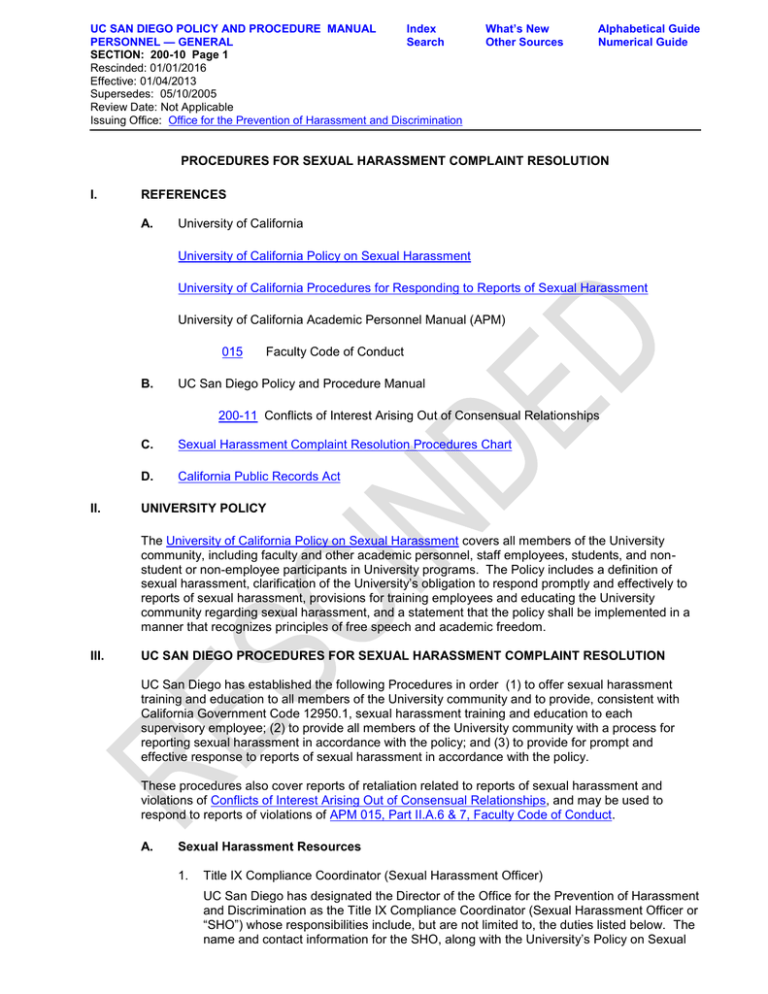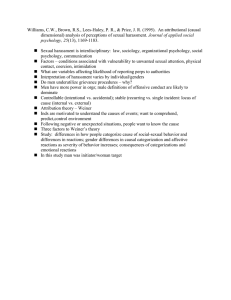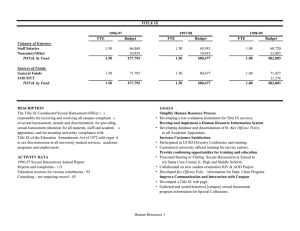
UC SAN DIEGO POLICY AND PROCEDURE MANUAL
Index
PERSONNEL — GENERAL
Search
SECTION: 200-10 Page 1
Rescinded: 01/01/2016
Effective: 01/04/2013
Supersedes: 05/10/2005
Review Date: Not Applicable
Issuing Office: Office for the Prevention of Harassment and Discrimination
What’s New
Other Sources
Alphabetical Guide
Numerical Guide
PROCEDURES FOR SEXUAL HARASSMENT COMPLAINT RESOLUTION
I.
REFERENCES
A.
University of California
University of California Policy on Sexual Harassment
University of California Procedures for Responding to Reports of Sexual Harassment
University of California Academic Personnel Manual (APM)
015
B.
Faculty Code of Conduct
UC San Diego Policy and Procedure Manual
200-11 Conflicts of Interest Arising Out of Consensual Relationships
II.
C.
Sexual Harassment Complaint Resolution Procedures Chart
D.
California Public Records Act
UNIVERSITY POLICY
The University of California Policy on Sexual Harassment covers all members of the University
community, including faculty and other academic personnel, staff employees, students, and nonstudent or non-employee participants in University programs. The Policy includes a definition of
sexual harassment, clarification of the University’s obligation to respond promptly and effectively to
reports of sexual harassment, provisions for training employees and educating the University
community regarding sexual harassment, and a statement that the policy shall be implemented in a
manner that recognizes principles of free speech and academic freedom.
III.
UC SAN DIEGO PROCEDURES FOR SEXUAL HARASSMENT COMPLAINT RESOLUTION
UC San Diego has established the following Procedures in order (1) to offer sexual harassment
training and education to all members of the University community and to provide, consistent with
California Government Code 12950.1, sexual harassment training and education to each
supervisory employee; (2) to provide all members of the University community with a process for
reporting sexual harassment in accordance with the policy; and (3) to provide for prompt and
effective response to reports of sexual harassment in accordance with the policy.
These procedures also cover reports of retaliation related to reports of sexual harassment and
violations of Conflicts of Interest Arising Out of Consensual Relationships, and may be used to
respond to reports of violations of APM 015, Part II.A.6 & 7, Faculty Code of Conduct.
A.
Sexual Harassment Resources
1.
Title IX Compliance Coordinator (Sexual Harassment Officer)
UC San Diego has designated the Director of the Office for the Prevention of Harassment
and Discrimination as the Title IX Compliance Coordinator (Sexual Harassment Officer or
“SHO”) whose responsibilities include, but are not limited to, the duties listed below. The
name and contact information for the SHO, along with the University’s Policy on Sexual
UC SAN DIEGO POLICY AND PROCEDURE MANUAL
Index
PERSONNEL — GENERAL
Search
SECTION: 200-10 Page 2
Rescinded: 01/01/2016
Effective: 01/04/2013
Supersedes: 05/10/2005
Review Date: Not Applicable
Issuing Office: Office for the Prevention of Harassment and Discrimination
What’s New
Other Sources
Alphabetical Guide
Numerical Guide
Harassment, may be found online at the website for the Office for the Prevention of
Harassment and Discrimination, http://ophd.ucsd.edu and may also be found on Blink.
a.
Plan and manage the local sexual harassment education and training programs.
The programs include wide dissemination of this policy to the UC San Diego
community; providing educational materials to promote compliance with the
policy and familiarity with local reporting procedures; and training UC San Diego
employees responsible for reporting or responding to reports of sexual
harassment.
b.
Develop and implement local procedures to provide for prompt and effective
response to reports of sexual harassment in accordance with this policy.
c.
Maintain records of reports of sexual harassment and actions taken in response
to reports, including records of investigations, voluntary resolutions, and
disciplinary action, as appropriate.
d.
Prepare and submit an annual report to the Office of the President, for
submission to The Regents, on sexual harassment complaint activity during the
preceding calendar year.
The SHO may assign responsibility for the completion of these duties as needed.
2.
Other Resources
Other members of the UC San Diego community may also serve as resources. These
include administrators at UC San Diego, including the Chancellor, Vice Chancellors,
Chief Executive Officers, Chief Financial Officers, Associate Directors, Deans,
Directors, Department Chairs, and administrative department heads, who are
responsible for understanding and implementing the UC San Diego sexual harassment
policy and procedures and for ensuring that the environment in their units is free of
sexual harassment.
Information regarding resources available may also be obtained at the Community
Centers (the Cross Cultural Center, the Women’s Center, and the Lesbian, Gay,
Bisexual, Transgender Resource Center); the Employee Support Services Team
(Employee Relations, Equal Opportunity / Staff Affirmative Action, Quality of Work/Life,
Academic Employee Relations, Faculty Staff Assistance Program, Employee Benefits,
Employee Rehabilitation, Risk Management); the Office of the Ombuds; Staff
Education; Psychological and Counseling Services; Student Legal Services; Student
Safety Awareness and Sexual Assault Resource Center; Healthcare Human
Resources; Graduate Medical Education; and other similar offices.
B.
Procedures for Reporting and Responding to Reports of Sexual Harassment
1.
Making Reports of Sexual Harassment
All members of the UC San Diego community are encouraged to contact the SHO if
they observe or encounter conduct that may be subject to the University’s Policy on
Sexual Harassment. Reports of sexual harassment may be brought to the SHO, to a
human resources coordinator, to the Dean of Students or Student Conduct Coordinator
when students are involved, or to any manager, supervisor, or other designated
employee responsible for responding to reports of sexual harassment. If the person to
whom harassment normally would be reported is the individual accused of harassment,
reports may be made to another manager, supervisor, human resources coordinator, or
designated employee. Managers, supervisors, and designated employees are required
UC SAN DIEGO POLICY AND PROCEDURE MANUAL
Index
PERSONNEL — GENERAL
Search
SECTION: 200-10 Page 3
Rescinded: 01/01/2016
Effective: 01/04/2013
Supersedes: 05/10/2005
Review Date: Not Applicable
Issuing Office: Office for the Prevention of Harassment and Discrimination
What’s New
Other Sources
Alphabetical Guide
Numerical Guide
to notify the SHO or other appropriate official designated to review and investigate
sexual harassment complaints when a report is received.
UC SAN DIEGO POLICY AND PROCEDURE MANUAL
Index
PERSONNEL — GENERAL
Search
SECTION: 200-10 Page 4
Rescinded: 01/01/2016
Effective: 01/04/2013
Supersedes: 05/10/2005
Review Date: Not Applicable
Issuing Office: Office for the Prevention of Harassment and Discrimination
What’s New
Other Sources
Alphabetical Guide
Numerical Guide
Reports of sexual harassment should be brought as soon as possible after the alleged
conduct occurs, optimally within one year. Prompt reporting will enable the University
to investigate the facts, determine the issues, and provide an appropriate remedy or
disciplinary action. Reports of sexual harassment brought after one year will be
responded to the greatest extent possible, taking into account the amount of time that
has passed since the alleged conduct occurred. Unreasonable delay in reporting by a
complainant may impede the University's ability to conduct an investigation and/or
effect appropriate remedial action, as well as the parties’ legal rights.
2.
Options for Resolution
Individuals making reports of sexual harassment will be informed about options for
resolving potential violations of the Policy on Sexual Harassment. These options
include procedures for Early Resolution, procedures for Formal Investigation, and filing
complaints or grievances under applicable UC San Diego complaint resolution or
grievance procedures. Individuals making reports also will be informed about policies
applying to confidentiality of reports under this policy (see F below). To the greatest
extent possible, reports of sexual harassment brought anonymously or brought by third
parties not directly involved in the harassment will be responded to. However, the
response to such reports may be limited if information contained in the report cannot be
verified by independent facts.
Individuals bringing reports of sexual harassment will also be informed about the range
of possible outcomes of the report, including interim protections, remedies for the
individual harmed by the harassment, and disciplinary actions that might be taken
against the accused as a result of the report, including information about the
procedures leading to such outcomes.
An individual who is subjected to retaliation (e.g., threats, intimidation, reprisals, or
adverse employment or educational actions) for having made a report of sexual
harassment in good faith, who assisted someone with a report of sexual harassment,
or who participated in any manner in an investigation or resolution of a report of sexual
harassment, may make a report of retaliation under these procedures. The report of
retaliation will be treated as a report of sexual harassment and will be subject to these
procedures.
3.
Procedures for Early Resolution
The goal of Early Resolution is to resolve concerns at the earliest stage possible.
Parties are encouraged to utilize Early Resolution options to resolve the situation
cooperatively and/or when a Formal Investigation is not likely to lead to a satisfactory
outcome. Early Resolution may include an inquiry into the facts, but typically does not
include a formal investigation. Means for Early Resolution are intended to be flexible
and encompass a full range of possible appropriate outcomes. Early Resolution may
include options such as mediating an agreement between the parties, separating the
parties, referring the parties to counseling programs, negotiating an agreement for
disciplinary action, conducting targeted educational and training programs, or providing
remedies for the individual harmed by the harassment. Early Resolution also may
include options such as discussions with the parties, making recommendations for
resolution, and conducting a follow-up review after a period of time to assure that the
resolution has been implemented effectively. Early Resolution may be appropriate for
responding to anonymous reports and/or third party reports. Steps taken to encourage
Early Resolution and agreements reached through early resolution efforts should be
documented.
UC SAN DIEGO POLICY AND PROCEDURE MANUAL
Index
PERSONNEL — GENERAL
Search
SECTION: 200-10 Page 5
Rescinded: 01/01/2016
Effective: 01/04/2013
Supersedes: 05/10/2005
Review Date: Not Applicable
Issuing Office: Office for the Prevention of Harassment and Discrimination
What’s New
Other Sources
Alphabetical Guide
Numerical Guide
While the University encourages early resolution of a complaint, UC San Diego does
not require that parties participate in Early Resolution. Some reports of sexual
harassment may not be appropriate for Early Resolution, but may require a formal
investigation at the discretion of the SHO or other appropriate official designated to
review and investigate sexual harassment complaints.
Where Early Resolution has been sought with the assistance of a UC San Diego official
other than the SHO (such as those mentioned in section A.2. above), such officials are
strongly encouraged to confer with and/or refer the complaint to the SHO. If the
complaint is not referred to the SHO, the administrator shall make an inquiry into the
incident, if appropriate, and attempt a resolution. All outcomes (successful or
unsuccessful resolutions) must be reported to the SHO within a reasonable period of
time of the resolution, typically thirty (30) calendar days.
4.
Procedures for Formal Investigation
In response to reports of sexual harassment in cases where Early Resolution is
inappropriate (such as when the facts are in dispute, in reports of serious misconduct,
or when reports involve individuals with a pattern of inappropriate behavior or allege
criminal acts such as stalking, sexual assault or physical assault) or in cases where
Early Resolution is unsuccessful, the SHO, or his/her designee, may conduct a Formal
Investigation. In such cases, the individual making the report shall be encouraged to
file a written request for Formal Investigation. The wishes of the individual making the
request shall be considered, but are not determinative, in the decision to initiate a
Formal Investigation of a report of sexual harassment. In cases where there is no
written request, the SHO or other appropriate official designated to review and
investigate sexual harassment complaints, in consultation with an appropriate UC San
Diego administrator, may initiate a Formal Investigation after making a preliminary
inquiry into the facts.
Formal Investigation of reports of sexual harassment includes the following:
a.
The individual(s) accused of conduct violating the Policy on Sexual Harassment
are provided a copy of the written request for Formal Investigation or otherwise
given a full and complete written statement of the allegations, and a copy of the
Policy on Sexual Harassment and these Procedures within a reasonable period
of time following the initiation of the formal investigation, typically within seven
(7) working days.
b.
The individual(s) conducting the investigation shall be familiar with the Policy on
Sexual Harassment and have training or experience in conducting
investigations.
c.
The investigation generally includes interviews with the parties if available,
interviews with other witnesses as needed, and a review of relevant documents
as appropriate. Disclosure of facts to parties and witnesses is limited to what is
reasonably necessary to conduct a fair and thorough investigation. Participants
in an investigation are advised that maintaining confidentiality is essential to
protect the integrity of the investigation and the privacy of those involved in the
investigation.
d.
Upon request, the complainant and the accused may each have a
representative present when he or she is interviewed. Other witnesses may
have a representative present at the discretion of the investigator or as required
by applicable University policy or collective bargaining agreement.
UC SAN DIEGO POLICY AND PROCEDURE MANUAL
Index
PERSONNEL — GENERAL
Search
SECTION: 200-10 Page 6
Rescinded: 01/01/2016
Effective: 01/04/2013
Supersedes: 05/10/2005
Review Date: Not Applicable
Issuing Office: Office for the Prevention of Harassment and Discrimination
C.
What’s New
Other Sources
Alphabetical Guide
Numerical Guide
e.
At any time during the investigation, the investigator may recommend that
interim protections or remedies for the complainant or witnesses be provided by
appropriate UC San Diego officials. These protections or remedies may include
separating the parties, placing limitations on contact between the parties, or
making alternative working or student housing arrangements. Failure to comply
with the terms of interim protections may be considered a separate violation of
the Policy on Sexual Harassment.
f.
The investigation shall be completed as promptly as possible and in most cases
within sixty (60) working days of the date the request for formal investigation was
filed. This deadline may be extended on approval by the relevant Vice
Chancellor. The Chair of the Academic Senate’s Committee on Privilege and
Tenure and the Senior Vice Chancellor-Academic Affairs shall be consulted
before a decision is made on requests for extensions involving faculty covered
by Academic Senate Bylaw 230.
g.
Generally, an investigation results in a written report that includes a statement of
the allegations and issues, the positions of the parties, a summary of the
evidence, findings of fact, and a determination by the investigator as to whether
University policy has been violated. The report will be submitted to the
appropriate UC San Diego official(s) with authority to implement the actions
necessary to resolve the complaint. The report may be used as evidence in
other related proceedings, such as subsequent complaints, grievances and/or
disciplinary actions.
h.
The complainant and the accused will be informed promptly in writing when the
investigation is completed. The complainant will be informed if there were
findings made that the policy was or was not violated and of actions taken to
resolve the complaint, if any, that are directly related to the complainant, such as
an order that the accused not contact the complainant. In accordance with
University policies protecting individuals’ privacy, the complainant may generally
be notified that the matter has been referred for disciplinary action, but will not
be informed of the details of the recommended disciplinary action without the
consent of the accused.
i.
The complainant and the accused may request a copy of the investigative report
pursuant to University policy governing privacy and access to personal
information (see UC Business & Finance Manual, RMP-8). However, the report
will be redacted to protect the privacy of personal and confidential information
regarding all individuals other than the individual requesting the report in
accordance with University policy.
j.
Within fifteen (15) working days of taking corrective or disciplinary action against
the accused, or a decision not to take any action, the appropriate UC San Diego
official(s) shall provide written notification to the SHO of what action, if any, has
been taken, including the results of any appeals.
Complaints or Grievances Involving Allegations of Sexual Harassment
An individual who believes that he or she has been subjected to sexual harassment may file a
complaint or grievance pursuant to the applicable complaint resolution or grievance procedure
listed in Appendix I: University Complaint Resolution and Grievance Procedures. Such
complaint or grievance may be filed either instead of or in addition to making a report of
sexual harassment to the SHO. A complaint or grievance alleging sexual harassment must
meet all the requirements under the applicable complaint resolution or grievance procedure,
including time limits for filing.
UC SAN DIEGO POLICY AND PROCEDURE MANUAL
Index
PERSONNEL — GENERAL
Search
SECTION: 200-10 Page 7
Rescinded: 01/01/2016
Effective: 01/04/2013
Supersedes: 05/10/2005
Review Date: Not Applicable
Issuing Office: Office for the Prevention of Harassment and Discrimination
What’s New
Other Sources
Alphabetical Guide
Numerical Guide
UC SAN DIEGO POLICY AND PROCEDURE MANUAL
Index
PERSONNEL — GENERAL
Search
SECTION: 200-10 Page 8
Rescinded: 01/01/2016
Effective: 01/04/2013
Supersedes: 05/10/2005
Review Date: Not Applicable
Issuing Office: Office for the Prevention of Harassment and Discrimination
What’s New
Other Sources
Alphabetical Guide
Numerical Guide
If a complaint or grievance alleging sexual harassment is filed in addition to a report made to
the SHO, the complaint or grievance shall be held in abeyance subject to the requirements of
any applicable complaint resolution or grievance procedure, pending the outcome of the Early
Resolution or Formal Investigation procedures. If the individual wishes to proceed with the
complaint or grievance, the Early Resolution or Formal Investigation shall constitute the first
step or steps of the applicable complaint resolution or grievance procedure.
An individual who has made a report of sexual harassment also may file a complaint or
grievance alleging that the actions taken in response to the report of sexual harassment did
not follow University policy. Such a complaint or grievance may not be filed to address a
disciplinary sanction imposed upon the accused. Any complaint or grievance regarding the
resolution of a report of sexual harassment under this procedure must be filed in a timely
manner, as provided in the applicable complaint resolution or grievance procedure listed in
Appendix I: University Complaint Resolution and Grievance Procedures. The time period for
filing begins on the date the individual was notified of the outcome of the sexual harassment
investigation or other resolution process pursuant to this policy, and/or of the actions taken by
the administration in response to the report of sexual harassment, whichever is later.
D.
Remedies and Referral to Disciplinary Procedures
Findings of violations of the Policy on Sexual Harassment may be considered in determining
remedies for individuals harmed by the sexual harassment and will be referred to applicable
disciplinary procedures (Appendix II). Procedures under this policy will be coordinated with
applicable complaint resolution, grievance, and disciplinary procedures to avoid duplication in
the fact-finding process whenever possible.
1.
The San Diego Division of the Academic Senate has formally agreed to allow the
formal investigation provided in this policy to stand in lieu of the appointment of an
Administrative Officer to conduct the preliminary investigation called for in Academic
Senate Bylaw 230.
2.
In matters involving accused students, the formal investigation provided in this Policy
stands in lieu of the investigation by the Student Conduct Coordinator or cognizant
College Dean.
3.
In matters involving accused medical students, the formal investigation provided in this
Policy stands in lieu of any investigation called for in the disciplinary proceedings
applicable to medical students.
4.
In matters involving accused pharmacy students, the formal investigation provided in
this Policy stands in lieu of any investigation called for in the disciplinary proceedings
applicable to pharmacy students.
Violations of the policy may include engaging in sexual harassment, retaliating against a
complainant reporting sexual harassment, violating interim protections, and filing intentionally
false charges of sexual harassment. Investigative reports made pursuant to this policy may
be used as evidence in subsequent complaint resolution, grievance, and disciplinary
proceedings as permitted by the applicable procedures.
UC SAN DIEGO POLICY AND PROCEDURE MANUAL
Index
PERSONNEL — GENERAL
Search
SECTION: 200-10 Page 9
Rescinded: 01/01/2016
Effective: 01/04/2013
Supersedes: 05/10/2005
Review Date: Not Applicable
Issuing Office: Office for the Prevention of Harassment and Discrimination
E.
What’s New
Other Sources
Alphabetical Guide
Numerical Guide
Privacy
UC San Diego protects the privacy of individuals involved in a report of sexual harassment to
the extent required by law and University policy. A report of sexual harassment may result in
the gathering of extremely sensitive information about individuals in the University community.
While such information is considered confidential, University policy regarding access to public
records and disclosure of personal information may require disclosure of certain information
concerning a report of sexual harassment. In such cases, every effort will be made to redact
the records in order to protect the privacy of individuals. An individual who has made a report
of sexual harassment may be informed of sanctions imposed against the accused when the
individual needs to be aware of the sanction in order for it to be fully effective (such as
restrictions on communication or contact with the individual who made the report). However,
information regarding disciplinary action taken against the accused will not be disclosed
without the accused’s consent, unless it is necessary to ensure compliance with the action or
the safety of individuals.
F.
Confidentiality of Reports of Sexual Harassment
University employees, such as the SHO, managers, supervisors, and other designated
employees have an obligation to respond to reports of sexual harassment, even if the
individual making the report requests that no action be taken. An individual’s requests
regarding the confidentiality of reports of sexual harassment will be considered in determining
an appropriate response; however, such requests will be considered in the dual contexts of
the University’s legal obligation to ensure a working and learning environment free from
sexual harassment and the due process rights of the accused to be informed of the
allegations and their source. Some level of disclosure may be necessary to ensure a
complete and fair investigation, although the University will comply with requests for
confidentiality to the extent possible.
Members of the UC San Diego community can consult with the confidential resources listed
below for advice and information regarding making a report of sexual harassment. These
resources provide individuals who may be interested in bringing a report of sexual
harassment with a safe place to discuss their concerns and learn about the procedures and
potential outcomes involved. Individuals who consult with confidential resources are advised
that their discussions in these settings are not considered reports of sexual harassment and
that without additional action by the individual, the discussions will not result in any action by
the University to resolve their concerns.
Confidential Resources at UC San Diego include:
Office of the Ombuds
Faculty Staff Assistance Program
Psychological and Counseling Services
Student Health Center
Student Legal Services Office
Contact information for these resources may be found online at the website for the Office for
the Prevention of Harassment and Discrimination, http://ophd.ucsd.edu and may also be
found on Blink.
G.
Retention of Records Regarding Reports of Sexual Harassment
The SHO is responsible for maintaining records relating to sexual harassment reports,
investigations, and resolutions. Records shall be maintained in accordance with University
records policies, generally five years after the date the complaint is resolved. Records may be
UC SAN DIEGO POLICY AND PROCEDURE MANUAL
Index
PERSONNEL — GENERAL
Search
SECTION: 200-10 Page 10
Rescinded: 01/01/2016
Effective: 01/04/2013
Supersedes: 05/10/2005
Review Date: Not Applicable
Issuing Office: Office for the Prevention of Harassment and Discrimination
What’s New
Other Sources
Alphabetical Guide
Numerical Guide
maintained longer at the discretion of the SHO in cases where the parties have a continuing
affiliation with the University or for other legitimate reasons. All records pertaining to pending
litigation or a request for records shall be maintained in accordance with instructions from
legal counsel.




